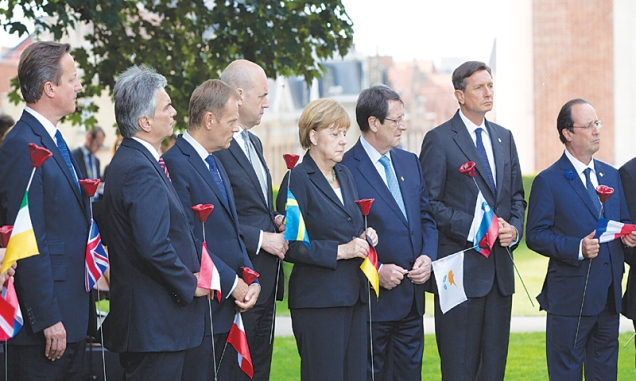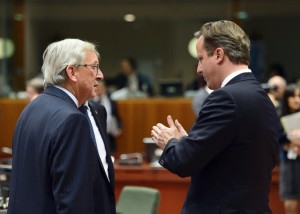
On June 26th and 27th, EU Heads of State or Government met in Ypres in order to commemorate the First World war, appoint the new President of the Commission and identify the strategic agenda – new directions and priorities – for the Union. This European Council’s meeting mattered for one simple reason: the fight about the future direction of the Union towards either a more federalist road, or towards some sorts of status-quo maintaining the current stagnation of the Union.
Juncker, Towards a Federalism?
The appointment of Jean-Claude Juncker, a centre-right Christian Democrat and former Prime Minister of Luxembourg and a European federalist, was seen as a signal for a motion towards further integration. Additionally, his appointment reflects the political inclination of Europe in accordance with the newly elected European Parliament. The party winning the elections in May was Europe People’s Party (EPP), the right wing party. “The Parliament, and the political groups, have made the most of the treaty language stating that parliamentary election results must be taken into account” writes Benjamin Fox of EUObserver, “when EU leaders nominate a person to replace Jose Manuel Barroso.” Such practice is known as spitzenkandidaten, or lead candidates. So EU leaders could difficulty go against popular wills. Not only Europeans do not see the European Parliament or these European elections as vital, but if European leaders were to already bend the law, one could imagine a widening of the democratic deficit and fueling the euroskeptic argument of extreme parties flourishing throughout Europe.
The appointment of Juncker was preceded by a political fight at the European level between the United Kingdom and Germany. One should underscore that France has progressively shied away from this political fraught. In the UK, Prime Minister Cameron has based/gambled most of his mandate on fighting the EU in the name of British national interest. His argument is that the integration of the EU and the expansion of its powers are not working in favor of British interests. He has, like all his elected leaders, sought to increase its political base by seeking the extreme side of his party. Cameron has since the beginning of his mandate threatened the EU by waving the card of a possible referendum on the future of the Britain’s EU membership (first, Cameron must be reelected in 2015, and the referendum could take place in 2017). Since the EP elections, Prime Minister Cameron has fought, a little bit like Don Quixote, the inevitable appointment of Juncker. Even the Economist consents by arguing that Cameron fought the right battle – spitzenkandidaten system -, but with the wrong tactics. Cameron’ strategy was purely political in order to demonstrate to his British fellows how much he has been fighting for Britain’s interests.

Cameron’s gamble has not paid off, but has contributed to widening the gap among EU Member States. With his narrow vision, Cameron has forced on a vote by qualified majority voting for the President of the Commission that he lost 26-2. Such vote requested by Cameron was unprecedented. The appointment followed the results of the European elections of May 2014. He threatened his European counterparts that the appointment of Juncker would contribute to pushing Britain further towards the exit of the Union.
The appointment of Juncker at the helm of the Commission is certainly positive in two aspects (one can read here the article titled The accidental president of Charlemagne in the Economist. This op-ed offers a completely different argument that the one advanced in this present commentary). First, after 10 years of a Barroso Commission, the EU needed a new leader. Barroso leaves Brussels with a very mixed, mostly negative, tenure. Second, for all pro-Europeans, Juncker seems a good appointment considering his experience, but most importantly his passion and understanding for the Union’s project.
However, the appointment of Juncker is fueling the debate about the future of the Union. His pro-European view, in favor of European federalism (even though we are very far from the creation of United States of Europe), is scaring many EU Member States aligned with the UK. The UK has been fighting for a return of powers from Brussels to the capitals. The current debate is directly embedded in the following directions: either, a deepening of the Union towards federalism; or, a stagnation of the deepening process with some sort of institutional status-quo. The Lisbon Treaty offers some instruments to move the deepening process, but Member States have since been effective in limiting it through the institutional maze.
The Strategic Agenda
Aside from the political appointment, EU Heads of State or Government identified five strategic dimensions for the future of the Union. The report is titled Strategic Age for the Union in Times of Change:
- stronger economies with more jobs, meaning boosting growth, competitiveness, and employment through lowering taxes, signing the TTIP in 2015, solidifying the EMU and the common market.
- societies enabled to empower and protect all citizens, through the reinforcement of the welfare state.
- a secure energy and climate future, by balancing out clean and cheap energy in order to secure energy consumption in Europe, while fighting against global warming.
- a trusted area of fundamental freedoms, securing the homeland from external and illegal migration, while preventing homeland crimes and terrorism through greater judiciary cooperation.
- effective joint action in the world, defending the interests and values of European citizens in the neighborhoods and beyond; engaging strategic partners, reinforcing bilateral and multilateral fora as well as continuing the deepening process of the CSDP.
Ultimately, these five strategic dimensions are not surprising and are very Union-like. They all encompass the weaknesses of the Union and the Member States’ willingness to cooperate on these matters. The interesting point is about the EU’s global role through the Common Security and Defense Policy. The conclusions express that the EU will increase its role and influence in the world “by strengthening the Common Security and Defence Policy, in full complementarity with NATO.” Does that mean that the EU and its Member States are dropping the idea of keeping the CSDP as a sole European project? Is the CSDP destine at some point to be merged inside NATO?
What is next?
Prior the European Council’s meeting five high level EU positions were up for grab: the President of the Commission, now filled by Juncker; the President of the Eurogroup, the powerful group of finance ministers of the Eurozone; the President of the European Parliament, filled once again by Martin Schulz reelected on the first round, getting 409 of the 621 today (July 1st); the President of the European Council; and the High Representative of the Union for Foreign Affairs/Vice-President of the Commission. Now that the Commission is in the hands of Juncker, Member States are now fighting over the distribution of the important Directorate Generals inside the Commission and the other very important posts, which will be decided during the next European Council’s meeting on July 16th. It appears that the EU’s Socialist and Social Democrats are now seeking for the next two big job: President of the Council and the HR. The Financial Times argues that European socialists want to secure the next two jobs in order to balance Juncker.
So far, the biggest speculations have been around the appointment of the next HR (read here the humorous and excellent Josef Janning’s job description for the next HR). According to the press, Federica Mogherini – Italy’s foreign minister -, the Dutch foreign minister Frans Timmermansmay, or even Kristalina Georgieva, the European Commissioner for International Cooperation, Humanitarian Aid and Crisis Response, may be the leading candidates for the job. In any case, the political game of thrones will continue to be played in between soccer games until the 16th of July.
(Copyright 2014 by Politipond. All Rights Reserved. This material may not be published, broadcast, rewritten or redistributed without permission.)
Hello I am so delighted I found your site, I really
found you by mistake, while I was researching on Aol for something else, Anyways
I am here now and would just like to say thank you for
a fantastic post and a all round thrilling blog (I also love the theme/design), I don’t
have time to go through it all at the minute but I have saved it and also included your
RSS feeds, so when I have time I will be back to read a lot more, Please do
keep up the fantastic jo.
LikeLike
It’s an remarkable piece of writing in favor of all the internet people;
they will take benefit from it I am sure.
LikeLike
Howdy! I understand this is somewhat off-topic however I had to ask.
Does running a well-established blog like yours take
a lot of work? I’m brand new to writing a blog however I
do write in my diary everyday. I’d like to start a blog
so I can easily share my personal experience and views online.
Please let me know if you have any ideas or tips for new aspiring blog owners.
Thankyou!
LikeLike
Hi, you just have to write often and be consistent about your topics. You need to have a very clear agenda and thematics. Last, make sure to really enjoy writing about the issues that you selected. Good luck.
LikeLike